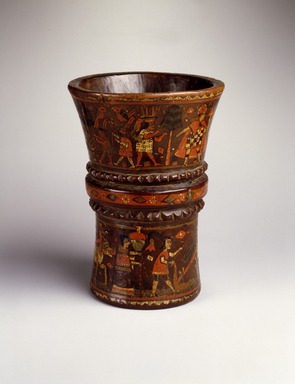
Artist:Quechua
Medium: Wood with pigment inlay
Geograhical Locations:
Dates:late 17th–18th century
Dimensions: 7 7/8 x 6 1/8 x 6 1/8 in. (20 x 15.6 x 15.6 cm)
Collections:
Museum Location: Luce Visible Storage and Study Center, 5th Floor
Exhibitions:
Accession Number: 42.149
Image: 42.149_SL3.jpg,
Catalogue Description: Kero cup with two registers of figural scenes separated by relief bands of flowers and geometric motifs. In the top register, two Incas battle three face-painted Antis or Chunchos. They wear spotted jaguar skin tunics and headdresses with two feathers in each. One of them has already fallen and lies under a tree, while the other two hold bows and arrows. A third Inca, wearing a checkerboard tunic, leads a fourth Anti, who wears a more elaborate feather headdress than the others and is presumably their leader, toward a castle and a seated Inca, possibly the Emperor himself. A hunchbacked figure holds a parasol over him. Above and to the right, a bird holds a sling and a bag in its beak. The lower register is an agricultural scene, possibly a ceremony, with two men guiding plows that are drawn by teams of two oxen. Each man is followed by a woman: one planting seeds and the other holding a pair of kero cups. During the Colonial era, Inca themes were generally portrayed on kero cups.